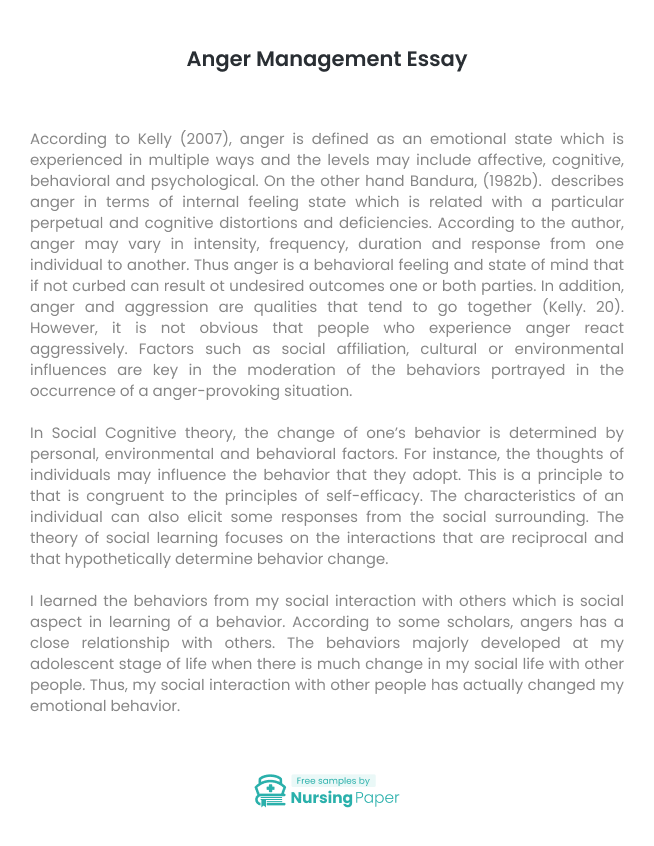
First Part
According to Kelly (2007), anger is defined as an emotional state which is experienced in multiple ways and the levels may include affective, cognitive, behavioral and psychological. On the other hand Bandura, (1982b). describes anger in terms of internal feeling state which is related with a particular perpetual and cognitive distortions and deficiencies. According to the author, anger may vary in intensity, frequency, duration and response from one individual to another. Thus anger is a behavioral feeling and state of mind that if not curbed can result ot undesired outcomes one or both parties. In addition, anger and aggression are qualities that tend to go together (Kelly. 20). However, it is not obvious that people who experience anger react aggressively. Factors such as social affiliation, cultural or environmental influences are key in the moderation of the behaviors portrayed in the occurrence of a anger-provoking situation.
In Social Cognitive theory, the change of one’s behavior is determined by personal, environmental and behavioral factors. For instance, the thoughts of individuals may influence the behavior that they adopt. This is a principle to that is congruent to the principles of self-efficacy. The characteristics of an individual can also elicit some responses from the social surrounding. The theory of social learning focuses on the interactions that are reciprocal and that hypothetically determine behavior change.


Second Part
I learned the behaviors from my social interaction with others which is social aspect in learning of a behavior. According to some scholars, angers has a close relationship with others. The behaviors majorly developed at my adolescent stage of life when there is much change in my social life with other people. Thus, my social interaction with other people has actually changed my emotional behavior. Social Cognitive theory (SCT) constructs that can be relevant to the behavior change related to anger management include observational learning, self-control, reinforcement and self-officially. Some of the strategies that can assist me in changing my behavior is having a high level of self-efficacy. This means that I need to believe in my ability to be able to overcome the challenges that come with anger. Self efficacy requires support and resources in order to boost the confidence of an individual.
The process of behavior change can start with carrying out observational learning. This will help me learn the actions and the outcomes of other people’s behaviors. Secondly, the ability to cope emotionally is an important part of managing anger. Besides that, I would need to have a strong sense of efficacy to be able to manage this health behavior. I have very high levels of confidence that through these SCT behavioral changing strategies I will be able to successful manage my anger behavior. Additionally, I am determined to have a good self-control strategy in order to avoid any negative consequences that may emerge from any emotional disturbances
Conclusion
Finally, Kelly, (2007) came up a multimedia technology toll called SMART Talk that is aimed at teaching anger management especially to adolescents. This is computer software that uses animation, simulations and cartons to show alternative ways of resolving conflicts. It enables one to understand the problem solving ways in dispute resolution and the strategies that can be used to deal with an escalated conflict.

1. Bandura, A. (1982b). The psychology of chance encounters and life paths. American
2. Psychologist, 37, 747-755.
3. Bandura, A. (1986). Social foundations of thought and action: A social cognitive theory.
4. Englewood Cliffs, NJ: Prentice-Hall.
5. Kelly, J. R. (2007). Mindfulness-based and Cognitive-behavior Therapy for Anger-management: an Integrated Approach



The download will start shortly.

The download will start shortly.
 Subject:
Medicine
Subject:
Medicine  Number of pages: 10
Number of pages: 10  Subject:
Health and Social Care
Subject:
Health and Social Care  Number of pages: 3
Number of pages: 3  Subject:
Health and Social Care
Subject:
Health and Social Care  Number of pages: 7
Number of pages: 7  Subject:
Nursing
Subject:
Nursing  Number of pages: 13
Number of pages: 13  Subject:
Nursing
Subject:
Nursing  Number of pages: 10
Number of pages: 10  Subject:
Health and Social Care
Subject:
Health and Social Care  Number of pages: 6
Number of pages: 6  Subject:
Medicine
Subject:
Medicine  Number of pages: 3
Number of pages: 3  Subject:
Nursing
Subject:
Nursing  Number of pages: 21
Number of pages: 21  Subject:
Nursing
Subject:
Nursing  Number of pages: 2
Number of pages: 2  Subject:
Health and Social Care
Subject:
Health and Social Care  Number of pages: 6
Number of pages: 6  Subject:
Health and Social Care
Subject:
Health and Social Care  Number of pages: 6
Number of pages: 6  Subject:
Health and Social Care
Subject:
Health and Social Care  Number of pages: 6
Number of pages: 6  Subject:
Health and Social Care
Subject:
Health and Social Care  Number of pages: 5
Number of pages: 5  Subject:
Health and Social Care
Subject:
Health and Social Care  Number of pages: 10
Number of pages: 10  Subject:
Health and Social Care
Subject:
Health and Social Care  Number of pages: 2
Number of pages: 2 
